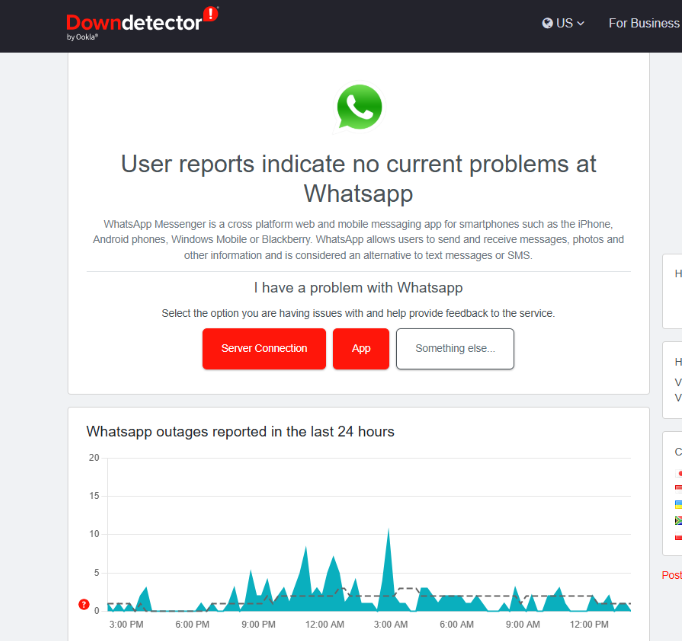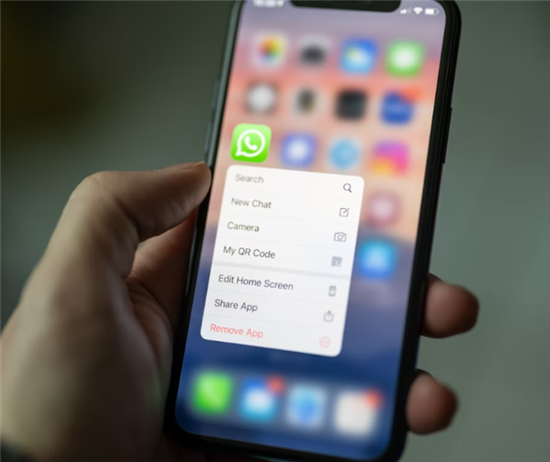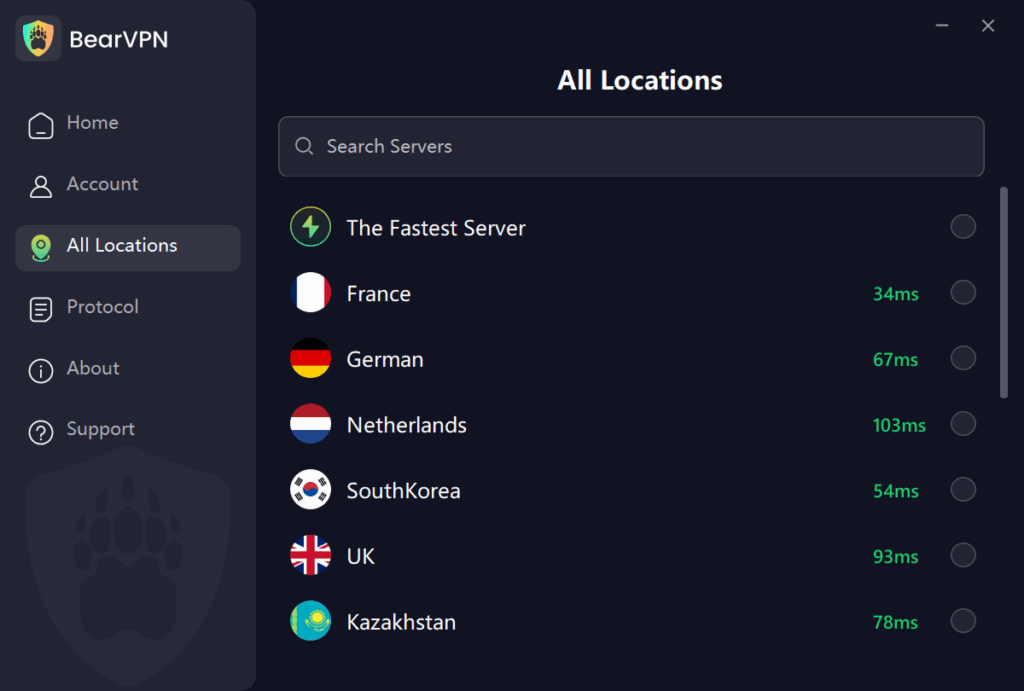When WhatsApp suddenly stops sending or receiving messages, a wave of confusion spreads across the globe. Whether you’re confirming an order, reaching out to someone abroad, or sending a quick voice note, communication seems to freeze in an instant.
Each time this happens, the internet lights up with one big question: Is WhatsApp down? During the major outage in April 2024, for example, more than 24,000 reports came from the U.S. alone, while India and Brazil trended worldwide under #WhatsAppDown.
The reason is simple — WhatsApp has become more than a chat app; it’s part of our daily infrastructure. Businesses use it for customer service and payments, families rely on it for cross-border calls, and media or aid organizations depend on it for secure coordination.
So when it stops working, it’s not just messages that pause — it’s work, connection, and even trust in digital life. But not every issue means a global outage. Sometimes the problem comes from your network, local restrictions, or your device itself.
In the following sections, we’ll explore how to tell what’s really happening — and what you can do to stay connected when WhatsApp goes silent.
Is WhatsApp Actually Down Right Now? (Real-Time Status)
Before assuming your phone is broken, check real-time outage trackers. These sites use crowdsourced data, server pings, and social monitoring to determine if WhatsApp is globally affected.
Key Tools to Verify WhatsApp Status
- Downdetector: Aggregates live user reports and visual outage maps.
- IsItDownRightNow: Monitors WhatsApp’s main server and reports HTTP response time.
- DownForEveryoneOrJustMe: Checks whether WhatsApp’s web domain is accessible from global nodes.
- StatusGator: Tracks WhatsApp’s operational history.
- Twitter/X: Searching “#WhatsAppDown” often reveals if millions are reporting issues simultaneously.

As of this writing, WhatsApp appears to be functioning normally with no major global outages reported.
If you see high outage reports in your country but not worldwide, the issue could be local — such as ISP throttling or government restrictions.
Pro Tip: Outage maps are crowdsourced; a spike may reflect a regional connectivity issue rather than a global collapse. Always cross-check at least two sources.
Why WhatsApp Might Not Be Working for You
Sometimes, WhatsApp appears to be down — but the problem isn’t global. If the app is working fine for others yet fails on your device, the cause usually falls into one of three categories: a server-side failure, a local network issue, or a regional restriction.
Global or Server-Side Failures
Occasionally, Meta’s backend servers experience temporary disruptions that affect WhatsApp worldwide. These can happen when DNS or routing problems interfere with global connectivity, or when the company rolls out infrastructure updates that briefly interrupt service.
Such outages are rare and typically resolved quickly, often within a few hours as Meta’s engineers restore full functionality.
Local or Network-Level Issues
If WhatsApp is only failing for you, the issue is likely closer to home. A weak internet connection — whether from low Wi-Fi signal strength or mobile data congestion — can easily stop messages from sending. Sometimes, corrupt cached data or an outdated version of the app prevents it from syncing properly.
There can also be more technical reasons: your network’s DNS settings might not be resolving WhatsApp’s domain correctly, or a firewall (such as one at work, school, or a public hotspot) could be blocking the app altogether.
Regional Restrictions or Censorship
This is perhaps the most misunderstood cause. In certain countries, WhatsApp is partially or fully restricted by government policy or telecom regulations. For example, the UAE and Qatar block WhatsApp voice and video calls to protect local telecom revenues, while China and Iran have periodically restricted the app entirely.
Even on a smaller scale, corporate or institutional firewalls sometimes disable WhatsApp Web to maintain productivity or control bandwidth usage. In these cases, it may look like an outage — but in reality, your access is being intentionally limited.
9 Quick Fixes When WhatsApp Is Down
Before rushing to reinstall WhatsApp or factory reset your phone, it’s best to take a calm, methodical approach. Many connection failures come from temporary issues — not app corruption. Follow these steps in order:
Fix 1. Check if WhatsApp is globally down
Visit reliable outage trackers like Downdetector or StatusGator to confirm whether WhatsApp’s servers are experiencing regional downtime. If it’s a global outage, you’ll just need to wait — no amount of local troubleshooting will fix it.
Fix 2. Restart WhatsApp and your device
This simple step clears temporary memory conflicts, resets background processes, and often resolves random disconnections or stuck “Connecting…” screens.

Fix 3. Switch networks
Try moving from Wi-Fi to mobile data or vice versa. If WhatsApp connects on one network but not the other, the issue lies with your ISP or router — not the app. You can also try connecting to a public Wi-Fi or hotspot for testing.
Fix 4. Update the app
Go to Google Play or the App Store and make sure you’re running the latest WhatsApp version. Outdated builds can lose compatibility after WhatsApp updates its server-side protocols, especially when new security layers roll out.
Fix 5. Clear WhatsApp cache (Android)
Go to Settings → Apps → WhatsApp → Storage → Clear Cache. This removes residual files that may cause app freezing, message send errors, or long loading times — without deleting your chats.
Fix 6. Reset your DNS or network settings
If your ISP or router is caching incorrect DNS routes, WhatsApp traffic may get misdirected or dropped entirely. Reset your DNS settings, or on mobile, use the option “Reset Network Settings” under system preferences. This flushes the routing tables and restores clean connectivity.
Fix 7. Disable proxy or unreliable VPN connections
If you’re using a low-quality or free VPN, it might block WhatsApp’s ports or leak your DNS, preventing message delivery. Turn it off temporarily to test. (We’ll cover how to use a reliable VPN like BearVPN shortly, which avoids these issues entirely.)
Fix 8. Test WhatsApp Web
Open web.whatsapp.com on your computer. If WhatsApp Web works but your mobile app doesn’t, the issue is likely local — corrupted app data or mobile permissions.
If both fail, the blockage is network-level, often caused by your ISP or government restrictions.
Fix 9. Ask peers in your region
Check if friends, family, or coworkers in your country can access WhatsApp. If everyone else’s app works fine, it’s likely your ISP or campus network is blocking access.
When WhatsApp Isn’t Down – It’s Blocked: Why a VPN Keeps You Connected
Most users don’t realize that what looks like “WhatsApp down” might actually be WhatsApp censored. In several regions, governments or ISPs silently restrict messaging apps, especially VoIP (voice/video calling).
Why Governments and ISPs Block WhatsApp
- Revenue protection: Telecom providers lose call income to WhatsApp.
- Censorship: Governments want to monitor or restrict encrypted communication.
- Traffic control: Some networks throttle messaging to manage bandwidth.
When WhatsApp is throttled or partially disabled, messages hang indefinitely or calls drop immediately — classic “is it down?” symptoms.
How a VPN Solves the Problem
A VPN for WhatsApp encrypts your traffic and routes it through another location, allowing you to bypass regional blocks and restore full functionality. It also hides your IP address, prevents ISP throttling, and stabilizes your connection by avoiding congested routes.
With a quality VPN, WhatsApp works as if you were in an unrestricted region — fast, secure, and uninterrupted.
Why BearVPN Is Built for WhatsApp
BearVPN is optimized for stable real-time communication, making it one of the most reliable tools to access WhatsApp anywhere. It offers 2,000+ servers across 50+ locations, ensuring fast global connectivity.
Unlike free or low-quality VPNs, BearVPN uses obfuscated servers to disguise VPN traffic, helping users stay connected even in regions with strict detection systems.
- It’s no-logs policy protects your chats and calls
- Multi-platform support keeps you secure across all devices.
- Mobile users can even start with a free plan, while 24/7 support ensures quick help when needed.
With BearVPN, WhatsApp stays open, stable, and private — no matter where you are.
How to Unblock WhatsApp Using BearVPN
If WhatsApp isn’t working due to regional restrictions, follow these quick steps to restore access:
Step 1. Download and install BearVPN from the official website or your app store. Available for Windows, iOS, and Android devices.
Step 2. Select a nearby unrestricted server — for example, Germany, the U.S., or Singapore. BearVPN offers 2,000+ servers in 50+ locations for fast and reliable access.

Step 3. Connect and wait for confirmation. Your traffic will now route securely through BearVPN’s encrypted tunnel.
Step 5. Open WhatsApp and test messages or calls. If it connects instantly, the issue was regional blocking.
Step 6. Optimize if needed. Switch between Direct Mode (faster) and Cloud Mode (stronger encryption), or change servers for best results.
Alternatives to WhatsApp: Staying Connected When Outages Happen
Even the best networks experience downtime.
If WhatsApp truly goes dark globally (as in April 2024), you can still maintain communication using secure alternatives:
- Signal: Encrypted and privacy-first, ideal for sensitive communication.
- Telegram: Robust broadcast channels and media sharing.
- Wire or Element: Business-grade encrypted messaging.
- Email or SMS fallback: Always good to have secondary contact methods.
BearVPN supports all these apps, ensuring your alternative connections stay stable and unblocked during crises. You might not control WhatsApp’s servers, but with a VPN, you control your access routes.
FAQs on Is WhatsApp Down
Is WhatsApp down right now?
Check Downdetector or StatusGator for the latest reports. As of now, WhatsApp is working normally in most regions.
Why can’t I send messages when my internet works fine?
Your network might be blocking WhatsApp ports or using a restrictive DNS. Try connecting through BearVPN to reroute the traffic.
Can a VPN really fix WhatsApp outages?
A VPN can’t restore WhatsApp if Meta’s servers are globally down. But it can bypass regional restrictions and make WhatsApp work if it’s blocked by your ISP or government.
Is it safe to use a VPN with WhatsApp?
Yes. VPNs encrypt your data end-to-end, adding another privacy layer on top of WhatsApp’s built-in encryption.
Is it legal to use a VPN for WhatsApp?
In most countries, yes. However, in nations with VPN restrictions (like the UAE or China), always review local laws before use.
Does using a VPN slow down WhatsApp?
High-quality VPNs like BearVPN minimize latency. Connecting to nearby servers usually keeps message and call performance smooth.
Why are WhatsApp calls blocked in some countries?
Telecom operators often disable VoIP features to protect local call revenues. VPNs help you bypass these blocks legally and securely.
Conclusion
When WhatsApp suddenly stops working, it can feel as if the world pauses for a moment. Yet as we’ve seen, “WhatsApp down” doesn’t always mean a global outage. Sometimes, it’s a regional firewall, local ISP policy, or a temporary routing issue quietly blocking your access.
Outage trackers help confirm the broader picture, while simple troubleshooting steps can resolve most local issues. But in regions where restrictions persist, a reliable VPN connection makes all the difference.
By encrypting your internet traffic and routing it through unrestricted servers, BearVPN helps restore access to WhatsApp and other essential communication tools — while protecting your privacy in the process.



